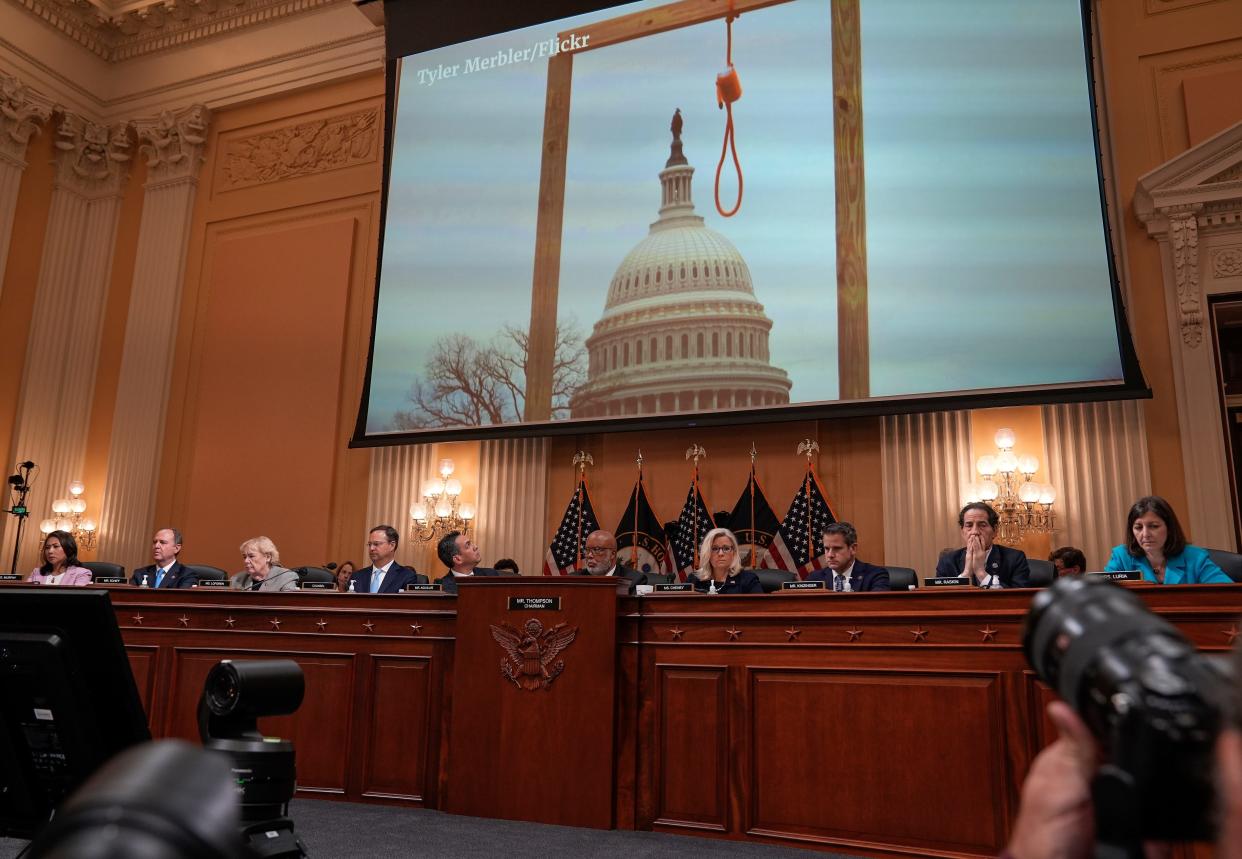Douglas Neckers: On the hearings

- Oops!Something went wrong.Please try again later.
- Oops!Something went wrong.Please try again later.
Some pundits, and most Republicans now in Congress, have tried to downplay the work of the Jan. 6 committee.
Just politics as usual, they like to say. With all due respect to all the ships at sea and talking heads on the tube ... I respectfully disagree. These hearings are incredibly important.
Federal buildings like the White House and the Capitol are secular sacred spaces — at least to those of us who grew up in the America that was. To watch goons invade the Rotunda, the place where millions of Americans have filed past the bodies of some of our greatest Presidents, was repulsive in the highest degree. U.S. Rep. Bob Latta, from Ohio’s 5th District, would give his eye teeth if a bust of his late father, Congressman Del Latta, could be on display there.
Why he isn’t half as exercised over Jan. 6, 2021, as I am is a real mystery. After all, he might have been killed had the mob breached the House chamber. One of the best speeches I can remember from the Rotunda was then-Vice President Dick Cheney’s eulogy for President Gerald Ford, after the older man died in December 2006.
“Sometimes in our political affairs, kindness and candor are only more prized for their scarcity. And sometimes even the most careful designs of men cannot improve upon history's accident. This was the case in the 62nd year of Gerald Ford's life, a bitter season in the life of our country,” Mr. Cheney said.
He was talking about August 1974, and it was bitter indeed. Mr. Ford really was an accidental President. A year before he took the oath, he never had any thought of being President or vice president.

But he became the first person in history to be appointed vice president in December, 1973, after Spiro Agnew resigned and pleaded guilty in connection with a payoff scandal. Eight months later, when President Nixon became the only president to resign in disgrace, Mr. Ford moved into the Oval Office.
Years later, Mr. Cheney, who served as President Ford’s chief of staff, would say “It was this man, Gerald R. Ford, who led our republic safely through a crisis that could have turned to catastrophe. We will never know what further unravelings, what greater malevolence might have come in that time of furies turned loose and hearts turned cold.”
James Cannon, Mr. Ford’s biographer, added, “this President's hardest decision was also among his first. And in September of 1974, Gerald Ford was almost alone in understanding that there can be no healing without pardon.”
Though today most experts agree that the pardon was the right thing to do, it was very unpopular at the time, and likely cost him the 1976 election, when he was defeated by Jimmy Carter.
President Ford thought that might happen — but he did it because he was convinced it was the right thing to do. The Cheney speech to honor Ford was brilliant and on the money.
Sometimes, integrity runs in a family’s blood. Dick Cheney has a daughter who is now almost equally famous — Liz Cheney, a lawyer who is in Congress and a member of the Jan. 6 committee.
Ideologically, her voting record marks her as a straight-down-the-line conservative Republican from Wyoming. But she’s a lot more than that — she’s a profile in courage, and an astute prosecutorial attorney.
In the committee’s first session, she took Donald Trump apart lock, stock and barrel. With precise and pointed use of witnesses, including members of Mr. Trump’s own family, she made it clear that the former President himself was the ultimate perpetrator of the January 6 insurrection. She then effectively laid out the case for a federal indictment of Donald Trump for sedition, or engaging in a conspiracy to engage in an unlawful act, namely, engaging in an insurrection.
She did not overtly suggest doing that — but any prosecutor watching her testimony was given a road map in how to begin.
Stay tuned. Liz Cheney, who seems likely to lose her seat in the House this year, could be an extremely strong candidate for president in 2024 — as a Republican, or perhaps an independent. If her performances on the national political stage in the future are anywhere near as insightful as they were before the committee, conservatives may have found a candidate who would be very tough to be deny.
— Douglas Neckers is an organic chemist, the McMaster distinguished professor emeritus and the founder of the Center for Photochemical Sciences at Bowling Green State Univis also a former board chair of the Robert H. Jackson Center in Jamestown, N.Y.
This article originally appeared on The Holland Sentinel: Douglas Neckers: On the hearings

